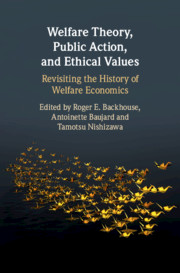Book contents
- Welfare Theory, Public Action, and Ethical Values
- Welfare Theory, Public Action, and Ethical Values
- Copyright page
- Contents
- Figures and Tables
- Contributors
- Acknowledgements
- Introduction: Revisiting the History of Welfare Economics
- Part I Plurality of Welfare in the Making of Welfare Economics
- Part II Developing Modern Welfare Economics
- 7 John Hicks’s Farewell to Economic Welfarism
- 8 Individualism and Ethics
- 9 Non-welfarism in the Early Debates over the Coase Theorem
- 10 Musgrave and the Idea of Community
- 11 Non-welfaristic Features of Kenneth Arrow’s Idea of Justice
- 12 Beyond Welfarism
- 13 The Influence of Sen’s Applied Economics on His Non-welfarist Approach to Justice
- 14 Conclusion
- Index
- References
11 - Non-welfaristic Features of Kenneth Arrow’s Idea of Justice
from Part II - Developing Modern Welfare Economics
Published online by Cambridge University Press: 04 March 2021
- Welfare Theory, Public Action, and Ethical Values
- Welfare Theory, Public Action, and Ethical Values
- Copyright page
- Contents
- Figures and Tables
- Contributors
- Acknowledgements
- Introduction: Revisiting the History of Welfare Economics
- Part I Plurality of Welfare in the Making of Welfare Economics
- Part II Developing Modern Welfare Economics
- 7 John Hicks’s Farewell to Economic Welfarism
- 8 Individualism and Ethics
- 9 Non-welfarism in the Early Debates over the Coase Theorem
- 10 Musgrave and the Idea of Community
- 11 Non-welfaristic Features of Kenneth Arrow’s Idea of Justice
- 12 Beyond Welfarism
- 13 The Influence of Sen’s Applied Economics on His Non-welfarist Approach to Justice
- 14 Conclusion
- Index
- References
Summary
This paper characterizes Kenneth Arrow’s contribution to justice issues in economics. When he established the fundamental theorems of welfare economics and the general impossibility theorem, his approach was seen as “welfarist”; however, he gradually came to accept that the consequences of economic and political decision-making are not always just, even when Pareto-optimal. The paper begins with some of his contributions to formal theory. Second, this paper illustrates how Arrow designed political and economic decisions using the same framework in the 1950s, and how he recognized that the significance of justice cannot be reduced to economic efficiency, as neither could it be defined in the strict welfarist informational framework. Finally, this paper argues that Arrow insisted that a criterion of justice can be deduced from the collective decision-making process in the hypothetical original position, because this position assumes equality. The paper concludes that Arrow’s idea of justice is based on a variety of values beyond utility, including non-welfaristic aspects such as freedom, equality, and fundamental rights.
Information
- Type
- Chapter
- Information
- Welfare Theory, Public Action, and Ethical ValuesRevisiting the History of Welfare Economics, pp. 256 - 276Publisher: Cambridge University PressPrint publication year: 2021
References
Accessibility standard: Unknown
Why this information is here
This section outlines the accessibility features of this content - including support for screen readers, full keyboard navigation and high-contrast display options. This may not be relevant for you.Accessibility Information
- 2
- Cited by
